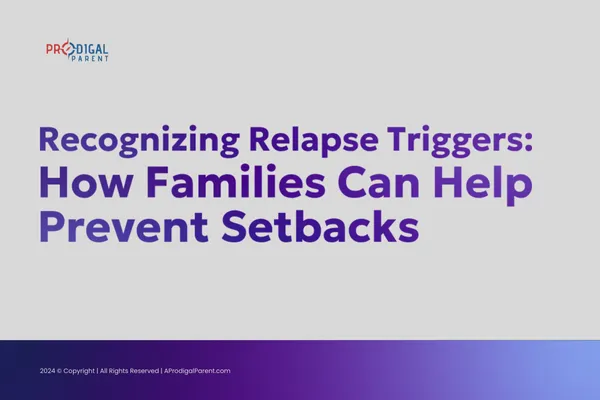
How Families Can Help Prevent Setbacks
Recognizing Relapse Triggers: How Families Can Help Prevent Setbacks
Relapse is a common concern for individuals recovering from substance dependency, and family support plays a key role in identifying and managing triggers that can lead to setbacks. By understanding these triggers and helping their loved one navigate them, families can become powerful allies in the recovery process. Here’s how families can recognize relapse triggers and offer the kind of support that promotes long-term success.
1. Understanding Common Triggers
Triggers are anything that sparks memories or urges associated with past substance use. These can be external (like certain places or social situations) or internal (such as stress or negative emotions). Here are a few common types:
Environmental Triggers: Places, people, or events that remind the individual of past substance use.
Emotional Triggers: Feelings like anger, sadness, or stress can push someone toward old habits as a coping mechanism.
Physical Discomfort: Pain, fatigue, or illness can sometimes increase the temptation to revert to substance use.
Families should stay mindful of these triggers and learn which ones may affect their loved one most.
2. Maintaining Open and Supportive Communication
One of the most effective ways families can help prevent relapse is by fostering open lines of communication. Encourage your loved one to share when they feel triggered. Rather than judging or trying to “fix” things, be a listening ear, providing a safe space for them to express their struggles. This openness builds trust and helps them feel supported during difficult times.
3. Encouraging Healthy Coping Strategies
Help your loved one replace old habits with new, healthier ones. Encourage practices like:
Exercise and Physical Activity: Physical exercise releases endorphins and reduces stress.
Mindfulness and Meditation: These practices improve mental clarity and emotional resilience.
Creative Outlets: Activities like art, music, or journaling can offer a constructive way to process emotions.
Support your loved one in finding the right activities that help them manage their emotions and stay focused on recovery.
4. Developing a Structured Routine
A structured routine can provide stability and reduce idle time, which can often lead to temptation. Help your loved one create a daily schedule that includes work or study, physical activity, meals, and relaxation time. Families can join in on some activities, like cooking healthy meals together or setting up a family game night, making recovery feel like a shared journey.
5. Setting Boundaries for Everyone’s Well-Being
Sometimes, families may unknowingly enable behaviors that make it easier for relapse to occur. Clear, healthy boundaries help protect everyone involved. Discuss acceptable and unacceptable behaviors and be consistent in maintaining these boundaries. This approach supports accountability while ensuring that the family’s support remains constructive.
6. Reinforcing Positive Progress
Celebrate each milestone in recovery, no matter how small. Whether it’s a week, month, or year of sobriety, acknowledging these achievements reinforces progress and boosts confidence. Positive reinforcement strengthens motivation and reminds your loved one of their accomplishments.
7. Seeking Professional Support
Relapse triggers can be complex and deeply rooted. Encourage your loved one to work with a therapist or counselor who specializes in addiction recovery. Many professionals can teach families about relapse prevention techniques and effective communication strategies. Family support groups are also a great way to connect with others who are navigating similar challenges.
Final Thoughts
Recognizing and managing relapse triggers is a team effort. By understanding potential triggers, communicating openly, and reinforcing healthy habits, families can help their loved one maintain a strong foundation in recovery. Recovery is a journey of resilience, and with the support of family, individuals can better navigate the challenges along the way, fostering a path toward lasting change.
Visit our website: www.AProdigalParent.com

